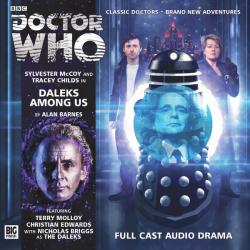Daleks Among Us (Big Finish)
Sunday, 22 September 2013 - Reviewed by

Daleks Among Us
Produced by Big Finish
Written by Alan Barnes
Directed by Ken Bentley
Released: September 2013
That Daleks Among Us’ storyline bears such a seemingly uncanny resemblance to those of past on-screen Who episodes at first in fact contributes to the overall impact of this trilogy finale more than most fans would likely expect. Last month’s Sontaran-laden Seventh Doctor outing offered its listeners a teasing glimpse of events to come as Frontier In Space once did for Planet of the Daleks, which could have inevitably caused concerns for followers of the range that similar to Planet itself, this release’s plot would take its good time to gather momentum. Nothing could be further from the truth, though, with Alan Barnes’ creation appearing only to be spurred forward by the arc threads already set in place for it to build upon.
Whether it’s in Barnes’ cunning re-introduction of Skaro’s iconic inhabitants into the Doctor’s world or in his subtle yet crucial interweaving of a resolution to Elizabeth Klein’s parallel universe identity arc into proceedings, there’s precious little in this particular script that can be faulted on the whole. Admittedly, the latter plot element has always come off as a tad convoluted and cumbersome for the range, something which was doubly apparent in Persuasion and Starlight Robbery, and the complexity of comprehending its climax is one of the few moments of detrimental impact in the piece. Yet such detriment is negligible for the majority, its resounding effect on the quality of the release being minimal at worst.
The scribe’s consistent and finely-paced work here is backed up with exhilarating gusto by the notably accomplished cast assembled for the release. Naturally, Sylvester McCoy’s Doctor grows as a more empathetic and tangibly heroic character during every instance in which he receives new material, the continuing success of McCoy in this case coming as no surprise. Despite their characters holding primary roles within the narrative, Tracey Childs and Christian Edwards’ portrayals of Klein and Will respectively are debatably restrained by their limited dialogue and significant actions, the former character serving as little more than a Russell T. Davies-esque deus ex machina initiator come the tale’s climax.
Enter Terry Molloy, whose much-warranted return to the role of Davros does not dissatisfy even slightly. As if Resurrection of the Daleks and Revelation of the Daleks weren’t enough to demonstrate the British thespian’s sheer ownership of the role of the Daleks’ creator in his classic series guise, the content Molloy performs here clearly reaffirms the fear and simultaneous pathos this tragic antagonist can evoke in his audience. Russell recently demonstrated the uncompromising, borderline self-destructive nature of Davros’ psyche in the aftermath of the Time War (The Stolen Earth/Journey’s End); however, more engaging by far is the opportunity Molloy enables for listeners to discover new truths surrounding a man whose existence is one of isolation and whose race no longer deems his existence a necessity.
Anyone approaching this latest encounter with Davros will no doubt recall that the exposure between McCoy’s Doctor and Molloy’s layered antagonist in Remembrance was slight to say the very least. Suitably, the two characters share further sequences in the same room this time around, and their tense dynamic maintains itself as one of the most compelling elements of the piece in its entirety. A sense pervades that (in the words of Christopher Nolan’s The Dark Knight screenplay) these two warring geniuses “have a destiny together”, their fates eternally linked by one’s desire to fight evil and the other’s to survive and conquer. Perhaps the Great Healer of old was destroyed in the Crucible in Russell’s Series Four finale, yet judging by his confirmed resilience in classic televised and audio instalments alike, his survival to fight the Time Lord another day is the more probable assertion.
It’s only a shame that the note on which this particular audio drama crescendos is not as effective as the conclusions of its predecessors. In those instances, Jonathan Barnes and Matt Fitton held the benefit of their ability to implement a thrilling cliff-hanger in preparation for the next instalment, a trait which (the other) Barnes neither needs to nor can logistically fulfil at the trilogy’s end. The shortcoming comes more as a result of Big Finish’s production approach than anything, but it’s simply notable enough that the Doctor, Klein and Will readying themselves for a further impending dangerous excursion through time and space isn’t a particularly daring send-off in comparison to recent televised season finales or indeed other ‘seasons’ in the various audio ranges.
Judged either on its own merits or as a cog within the metaphorical machine of the trilogy, Daleks Among Us is an imperfect but immensely gratifying experience for the listener. McCoy and Molloy both shine marvellously in their performances in spite of the remainder of the main and supporting cast failing to match them, and in spite of the primary titular antagonists not having any particularly bold impact on the core narrative. This isn’t the splendid gem that Starlight Robbery emerged to be last month, that’s for sure. In many ways, though, it’s a hidden gem, its defining strengths counterbalancing its shortcomings by a notable margin. There’s an old saying which asserts that we never truly stop learning, and in this case, even in Doctor Who’s 50th Anniversary year, it appears (incredibly) that writers like Barnes still have plenty of exhilarating lessons to teach yet.







